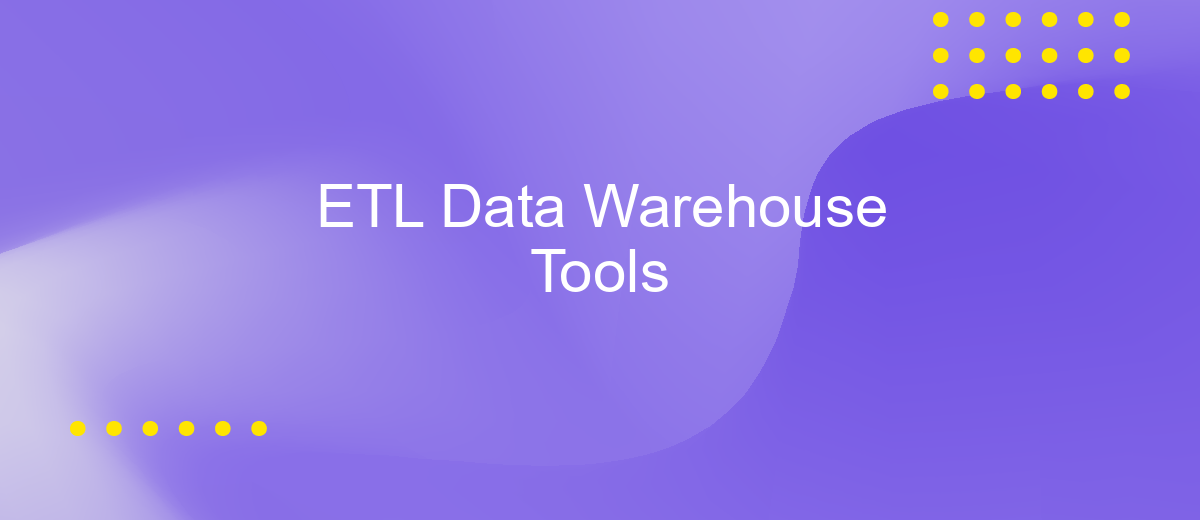ETL Data Warehouse Tools
ETL (Extract, Transform, Load) data warehouse tools are essential for managing and optimizing the flow of data from various sources into a centralized repository. These tools streamline the process of data extraction, transformation, and loading, ensuring data integrity and accessibility for business intelligence and analytics. In this article, we explore the top ETL tools that can enhance your data warehousing strategy.
Introduction
ETL (Extract, Transform, Load) tools are critical for managing and optimizing data workflows within data warehouses. These tools facilitate the extraction of data from various sources, its transformation into a usable format, and the loading of this data into a data warehouse for analysis and reporting. ETL processes are essential for businesses that rely on data-driven decision-making to gain insights and maintain a competitive edge.
- Extraction: Gathering data from multiple, often disparate sources.
- Transformation: Converting the extracted data into a suitable format or structure for analysis.
- Loading: Inserting the transformed data into a data warehouse or other storage solutions.
One notable tool that simplifies the integration of various data sources is ApiX-Drive. It allows seamless connections between different applications and services, automating the data flow and reducing manual intervention. By leveraging such tools, businesses can ensure that their data pipelines are efficient, reliable, and capable of supporting robust analytical processes.
Key Considerations

When selecting ETL Data Warehouse tools, it is crucial to consider factors such as scalability and performance. Ensure the tool can handle your current data volume and scale with your future growth. Performance metrics like data processing speed and system reliability are also essential to evaluate. Additionally, the tool should support a wide range of data sources and destinations to facilitate seamless integration within your existing infrastructure.
Another important consideration is the ease of use and flexibility of the ETL tool. Tools that offer user-friendly interfaces and robust automation capabilities can significantly reduce the complexity of data integration tasks. For instance, services like ApiX-Drive can simplify the integration process by providing pre-built connectors and automation features, making it easier to manage data workflows without extensive coding. Lastly, consider the cost of ownership, including licensing fees, maintenance, and potential training costs, to ensure the tool aligns with your budget constraints.
Popular ETL Tools

ETL (Extract, Transform, Load) tools are essential for data warehousing as they help in extracting data from various sources, transforming it into a suitable format, and loading it into a data warehouse. These tools simplify data integration and ensure data consistency and quality.
- Informatica PowerCenter: A robust ETL tool that offers comprehensive data integration capabilities, supporting a wide range of data sources and formats.
- Talend: An open-source ETL tool that provides extensive data integration and transformation features, making it suitable for various data warehousing needs.
- Apache NiFi: A powerful ETL tool known for its real-time data processing capabilities and user-friendly interface for designing data flows.
- ApiX-Drive: A versatile tool that facilitates easy integration of various applications and services, streamlining the ETL process through automated workflows.
- Microsoft SQL Server Integration Services (SSIS): A popular ETL tool that integrates seamlessly with Microsoft SQL Server, offering a wide range of data transformation and loading options.
These ETL tools play a crucial role in ensuring that data is accurately and efficiently moved from source systems to data warehouses. By leveraging tools like ApiX-Drive, organizations can automate and optimize their data integration processes, leading to more reliable and timely insights.
Case Study

Company X, a leading e-commerce platform, faced challenges in managing and analyzing their vast amounts of transactional data. They required a robust ETL tool to streamline data integration from multiple sources into their data warehouse. After evaluating several solutions, they chose ApiX-Drive for its user-friendly interface and powerful capabilities.
ApiX-Drive enabled Company X to automate the extraction, transformation, and loading of data from various sources such as sales platforms, CRM systems, and marketing tools. This automation significantly reduced manual efforts and minimized errors in data handling.
- Seamless integration with multiple data sources
- Automated data transformation processes
- Real-time data synchronization
- User-friendly interface for easy configuration
As a result, Company X experienced a 40% increase in operational efficiency and a 30% reduction in data processing time. The use of ApiX-Drive allowed their data team to focus on more strategic tasks, ultimately leading to improved decision-making and business growth.
- Automate the work of an online store or landing
- Empower through integration
- Don't spend money on programmers and integrators
- Save time by automating routine tasks
Future Trends
The future of ETL Data Warehouse Tools is poised for significant advancements driven by the increasing demand for real-time data processing and integration. As businesses continue to generate massive amounts of data, the need for more efficient and scalable ETL solutions becomes paramount. Emerging technologies such as artificial intelligence and machine learning will play a crucial role in automating complex data transformations, improving accuracy, and reducing manual intervention. Additionally, the integration of ETL tools with cloud-based platforms will enable organizations to leverage the flexibility and scalability of the cloud, ensuring seamless data management and accessibility.
Another trend shaping the future of ETL tools is the emphasis on low-code and no-code platforms, which empower non-technical users to create and manage data workflows with ease. Services like ApiX-Drive are at the forefront of this movement, offering user-friendly interfaces that simplify the integration of various data sources and applications. By enabling easy configuration and automation of data pipelines, such services help businesses to quickly adapt to changing data needs and streamline their operations. As the landscape of data management continues to evolve, these innovations will be essential in driving efficiency and competitiveness.
FAQ
What is ETL in the context of data warehousing?
Why is ETL important for data warehousing?
What are some common challenges in ETL processes?
How can automation tools help in managing ETL processes?
What is ApiX-Drive and how does it assist with ETL processes?
Apix-Drive is a simple and efficient system connector that will help you automate routine tasks and optimize business processes. You can save time and money, direct these resources to more important purposes. Test ApiX-Drive and make sure that this tool will relieve your employees and after 5 minutes of settings your business will start working faster.


